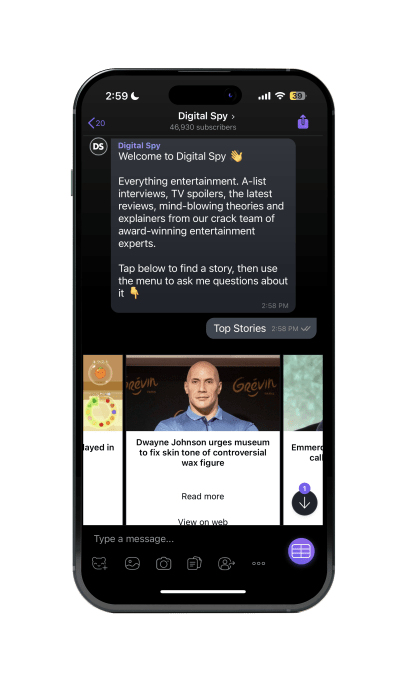As publishers block AI web crawlers, Direqt is building AI chatbots for the media industry
A number of news and media publishers are already blocking AI web crawlers from accessing their sites, worried about the impact on traffic when all their work is swept up into AI chatbot experiences. However, a startup called Direqt believes publishers should embrace AI chatbots — just on their own terms. The company, which has now raised its first outside capital of $4.5 million, offers media companies like ESPN, GQ, Wired, Vogue, Cosmopolitan, and others, their own customizable chatbot solutions that provide a direct connection to their audience, increased engagement with their own published content, as well as monetization via ads.
The startup was originally founded in 2017 with a focus on chatbot monetization, before turning more recently to AI. In its earlier days, the company had built out the ability to serve promotions and ads inside a chatbot experience, which it licensed to a larger customer in the U.S. In 2021, the team pivoted to start building a chatbot platform for publishers, still slightly ahead of the GPT wave and the rise of ChatGPT.
“Part of that was, candidly, us being a little bit early to the market,” remarked Direqt co-founder and Chief Commercial Officer Nick Martin. “Fortunately, things over the last couple of months have really broken the direction we did anticipate all these years,” he said.

Image Credits: Direqt
The idea was that the existing chatbot platforms that had been built at the time were originally created for other purposes, like customer service, and didn’t really meet the needs of publishers. So the team decided they’d take on the challenge of building a platform that could work for publishers.
The team also realized that about 10% of consumers’ time on mobile was spent on messaging apps, like iMessage, WhatsApp, Telegram, Messenger, Viber, and others, and around 5.3 billion people around the world engage in messaging. Meanwhile, publishers were telling Direqt they wanted a direct relationship with readers, rather than having to rely on the ever-changing whims of Big Tech companies, like Meta and Google, which have been distancing themselves from the news business in recent years.
Meta, for instance, has been pulling news from its products after adjusting algorithms in ways that negatively impacted publishers, and Google recently laid off a portion of its news team.
While the earlier chatbot product for publishers leveraged tools like NLP and AI, over the last 18 months, Direqt has enhanced the platform to support more capabilities, including those that rely on generative AI.
Publishers can choose to implement their chatbot in ways that fit their own business’s AI policy and strategy, whether that means simpler, non-AI chatbots that let users ask about stories their team has written; those where editorial teams curate the AI-generated content before it goes live; or those where AI could generate a quiz or a set of questions about the story, and so on.

Image Credits: Direqt
Or, if the publisher simply wants their own version of ChatGPT, that’s also possible, as Direqt works with OpenAI and other AI vendors, including Google, to meet the publishers’ goals.
The generative AI experiences have the most draw at present, even though some publishers may not have yet finalized their AI strategy.
“Almost everyone that we work with is trying to figure out their generative AI strategy if they haven’t already started deploying things,” says Martin. “There’s been a really fast-paced development in the perspectives around it since November 30 of last year to about 12 months later…we haven’t met a publisher yet, who’s like ‘we don’t want to do this,’” he says.
In fact, publishers may even be fighting some AI battles — like suing AI companies for aggregating their content into their models without permission — even as they move forward with their own bots.
“There doesn’t seem to be much of a sense of like, we’re scared of this technology and we don’t want to use it,” Martin continues. “There’s certainly a fear and a concern around AI through a few lenses — what it’s going to do to traffic from search, what is the impact on the creative and writers and journalism — and those two things are pretty massive. But it does seem that in all of the private conversations, everybody has a very sober view on the technology — [as in] ‘it’s not going back in the box, we need to figure this out.’”
As publishers are beginning to gear up for their annual planning, quite a few have plans to implement generative AI experiences in 2024, he notes.

Image Credits: Direqt
To ingest publishers’ content, Direqt can leverage RSS feeds or, with permission, scrape the website.
The publishers’ chatbot experience itself can also be placed wherever the publisher wants, including directly on their website with a few lines of code, within partnered messaging apps that reach a collective 260+ million users. (Supported apps include Google Messages, SMS, and Viber, with Messenger and WhatsApp to soon come.) And, later this quarter, social media will also be supported. In the case of the latter, Direqt is launching an integration with Instagram where users can comment on the publisher’s post, which will trigger the chatbot to initiate a conversation in Instagram’s DMs.
Today, the company has 75 brands on its platform, including names like Good Housekeeping UK, Women’s Health UK, ClutchPoints, Bob Vila, Dance Magazine, Hollywood.com, Indy100, Popular Science, The Drive, Domino, Field & Stream, Outdoor Life, Task & Purpose, Car Bibles, Popular Photography, and others.
Within the chats, the bots serve links to publisher content, which see an average clickthrough rate (CTR) of 24.16%, compared with the average email CTR of 3.48% per active campaign. One customer, Mitch Rubenstein, founder of the Sci-Fi Channel and owner of Hollywood.com & Dance Magazine, said Direqt has boosted time-on-site by over 200%.
In addition to providing direct traffic, Direqt has a hybrid business model. Publishers can choose between a SaaS approach where it’s paid a platform licensing fee based on transaction volume, or a revenue-based model where Direqt takes a cut of the in-chat ad revenue that runs inside the platform. Those ads can be sold by the publishers or can include ads from Direqt’s 500 advertiser partners and other partners.
For publishers dependent on ad revenue, chat appears to be a good solution.
“There’s market data that suggests performance in chat is significantly higher to the order of 10% and 10x, depending on which source you’re looking at, that in-chat ads outperform traditional advertising,” Martin notes.
In addition to Martin, formerly the co-founder and COO of a sports equipment manufacturer, Direqt was co-founded by serial entrepreneur John Duffy, a co-founder of another chatbot company 3Cinteractive; Myk Willis, a former Citrix engineer, and co-founder and CEO of streaming radio company Myxer; and Bill Madden, a former IBM product engineer.
The team has now raised its first round of capital, a seed round of $4.5 million from investors including various entrepreneurs and executives, including Todd Parker, former Global Head of Business Development for Business Messaging at Google; NFL Hall of Famer Dan Marino; Peter Callahan, Former CEO of American Media; Ron Antevy, Founder & CEO e-Builder; and Dave Walsh, Partner at Kayne Anderson.
The funds will help Direqt accelerate product development, roadmap, and go-to-market, and allow it to double its headcount from 15 to about 30 people by the end of next year. The Seattle-headquartered company aims to improve the core conversational engine it offers, increasing its monetization capabilities and unlocking more distribution with the new funds, as well.


